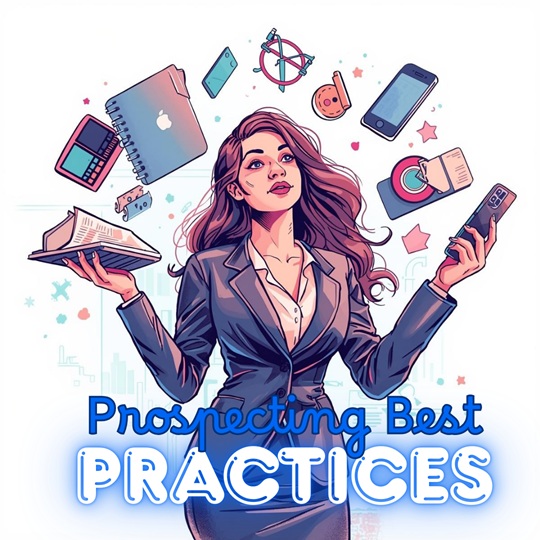Ever thought of the perfect thing to say just after you should have said. We've all been there. We rehearse conversations or presentations so why not sales calls. Having sales scripts is a great way to be ready for anything.
Sales scripts are an essential part of every successful salesperson’s toolkit. They supplement your sales software to help you close deals. Sales scripts help you prepare for conversations and guide you through the process of selling, making it easier to have natural interactions with any kind of buyer including a company CEO.
When you write good sales scripts for presentations, your buyer will feel like they have a friend in the room who cares about their needs—and that’s exactly what they should feel like!
What are Sales Scripts
A sales script is a prewritten conversation guide where you write down exactly what you are going to say and in some cases what you think a prospects response will be to what you are saying.
Sales scripts can be used in any sales presentation. You can use them in a one-on-one meeting or a presentation to a group.
You can also use scripts over the phone or via email. Sales scripts are useful for helping you stay on track and keep your message consistent across different contact points.
Main Part of Sales Scripts
There are three main parts to a sales script: The opener, the value proposition, and the close.
- The opener is where you introduce yourself to the buyer and build rapport.
- The value proposition is where you explain what you've got to offer them to solve their problem.
- And the close is when you ask for the sale.
Benefits of Sales Scripts
The benefits of using sales scripts to automate the sales process are limitless.
If you want to sell anything to anyone in any market, you have to become an expert at writing and using sales scripts.
Sales scripts will help you close leads at a faster rate. This is important because as you know time is money (Fun Fact: The saying “Time is money” comes from Benjamin Franklin’s “Advice to a Young Tradesman, [21 July 1748],” Founders Online, National Archives, where he claims that time wasted is money wasted.
So using a sales script saves time, money, and gets you more Benjamins baby!)
Personalize Sales Script to Feel Natural
Your script should be natural, using your own words and voice.
It's important that the language feels authentic and sounds like it came from you. You never want to sound like a detached robot trying to hawk products.
Keep in mind that your voice is unique and no one else can speak for your company or product like you can! Lean into that.
Your script should also reflect other aspects of who you are as well—the tone of voice, the examples or stories used, and even the language used.
Your scripts should sound like they come from someone who knows what they're talking about and wants to share their knowledge with others.
Related: Example Cold Calling Scripts
Don’t Memorize Sales Script Word-for-Word
Instead, focus on understanding the concepts behind each section of the script.
The best salespeople don't memorize their scripts word for word. Instead, they understand the concepts behind each section of the script, and then use body language and tonality to add to their delivery.
This is because one size doesn't fit all when it comes to sales scripts. In other words one script may work for one prospect, but then it may need to be tweaked with another prospect.
With this in mind, you need to tailor your presentation according to who you're talking with and what they're looking for.
The most important thing to remember is that your script should be written around your personal style of communication, not vice versa.
If you have trouble speaking in front of others or you're uncomfortable reading aloud from a piece of paper, try recording yourself saying each line first and get comfortable with the content of the scripts. This way during training sessions later (or even just practicing alone at home), it'll feel more natural and there won’t be any awkward silences because you can’t remember what to say next.
Additionally, to really get good at your script practice in front of a mirror and pay attention to the facial gestures that you make because this plays a part in how persuasive your script is.
Use Body Language and Tonality to Punch Up Scripts
Increase the persuasive appeal of your scripts with body language and tonality.
A sales pitch isn't just about words, it's also about how you say those words (great article on tone and sales success). The way you carry yourself can help your prospects understand how much you believe in the value of your product or service, and whether they should trust you as a source of information.
When writing out your scripts, think about how to use your body language and tone of voice to convey that confidence:
- Use a friendly tone of voice
- Nod attentively when someone speaks
- Smile naturally when appropriate
Your Sales Script is a Roadmap, But Don’t be Afraid to Veer
Once you’ve developed a sales script, don’t be afraid to improvise using your script as a roadmap for the conversation.
You may find that the buyer responds best by hearing more details about the product, or perhaps they want to discuss their own projects first before getting into yours. Either way, don’t worry about sticking to every word of your outline.
A Sales Script Keeps you Focused on the Buyer
A sales script is an excellent way to run effective one-on-one interactions with buyers.
A sales script helps you stay on track by allowing you to focus on the most important aspects of each conversation. It also helps you stay focused, because it's easy to get distracted when having a conversation with a buyer.
A well thought out sales script can help you avoid getting off topic, and stay focused on asking questions and listening effectively.
In addition to being more effective, using a sales script can make your interactions feel more natural and less forced. With scripts you’re forced to carefully craft responses that help guide the prospect through the buying process.
Finally, using a well thought out and carefully refined sales script gives buyers confidence. When you can speak clearly and confidently, you let the prospect know that they're dealing with someone who knows what they're doing and isn't wasting their time!
Here are 18 reasons why using sales scripts is so important
Sales presentation scripts can be a valuable resource for any company including small business owners looking to grow their sales revenue. They can provide structure, consistency, and effective communication for sales interactions.
The following 18 reasons explain why it's important for business to use sales scripts.
#1: Listen to Your Prospects
Leveraging sales scripts allows you to really listen to what your prospects are saying while you are pitching your product.
If you are not using sales scripts and you aren’t prepared to handle any and every objection, it’s twice as hard to close the sale.
Sales scripting buys you more time in each sale. You get to spend time listening instead of thinking about what you are going to say next. T
his gets you to the close half as fast, because you are prepared for every situation.
#2: Guide the Conversation
Scripts help guide the conversation from Point A (introduction and sales discovery) to Point B (pitching, closing, and winning) quickly and efficiently.
They provide you with a golden path to higher conversion rates.
Related: Cold calling guide
#3: Sell Faster
Sales scripts allow you to move faster in each sales presentation because they force you to not only prepare to handle objections, but they give you the confidence to sell powerfully and assertively. This enables you to move through calls, emails, social touches, and pitches as fast as possible.
Sales success is a numbers game. The more often you pitch, the more often you close. And sales scripts allow you to sell better, faster.
Top salespeople take the time before every sale to figure out rebuttals for every possible objection because they know they will run into them every single day.
Objections are predictable. But your responses can be natural and effective when you use this book to practice and plan ahead. Preparing yourself with solid scripts allows you to gently handle these objections and move smoothly back into your pitch.
#4: Leverage Industry Leaders
When you leverage scripts from industry leaders like Seven Figure Social Selling, you can rinse and repeat top tactics and strategies.
This is especially important for new sales reps because with proven and tested scripts you get an immediate sense of what works and what doesn’t early in your career.
With scripts you can eliminate the learning curve. And you get to begin each sale with more confidence because you are already prepared with the most effective ways to communicate when a prospect objects to a sale.
#5: Streamline the Training Process
For all the managers and team leaders out there, sales scripts save time during the training and onboarding processes.
Instead of taking 90 days to fully train a new rep, sales scripts provide you with all the tools to get them trained and fully ramped. They can become a high performing sales rep in a matter of days, maybe even hours.
Eliminate all the insecurities new reps have by arming them with solid scripts.
#6: Follow a Map
Sales Scripts are the GPS that leads you to the close.
They serve as a map and they help you navigate to the desired destination. Scripting frees you from the worries of wasted time “driving” to the wrong place (constant back-and-forth with a prospect, focusing on unqualified prospects, etc.).
They provide a proven path that, when studied and used, leads you and the prospect to a win/win situation every time.
#7: Give the Prospect What They Want
Your prospect subconsciously expects certain things to happen at certain points during a sale.
The structure of your pitch helps reveal information seamlessly and keeps the prospect hooked. Without realizing it, a well-structured pitch (which is possible with a good script) causes your prospect to stay engaged in the conversation and want to learn more about your solution.
# 8: Control the Conversation
When it comes to pitching prospects, the pacing is critical to keep your prospect interested and open to the sale.
Releasing information too quickly or not allowing your prospect the time to ask questions and offer objections, takes away your power to build a personal relationship and value in the product itself.
Scripts and questions enable you to slow down and keep control of the sales conversation.
# 9: Manage the Outcome of a Pitch
Sales scripting is like movie scripting.
Like a writer or a film director, you design and determine the outcome. As you write and eventually edit each scene (in this case each stage of the sales process) with a clear goal in mind, you will lead your prospect to a successful conclusion and close.
Scripting puts you in the director’s role and allows you to write your way into a happy ending for both you and your prospect.
#10: Build a Blueprint
Construction workers do not build a house before they draft a blueprint.
Scripting keeps you from skipping steps in your sale and allows you to get a solid plan in place.
They give you a solid foundation and framework for your pitch so that you can find and close prospects and turn them into lifetime clients .
#11: Leverage the Power of Tonality
It’s not just what you say that will make a difference in each sale, it’s how you say it.
Scripting and knowing your lines ahead of time allows you to maximize other aspects of communication like tonality and nonverbal communication.
This keeps you from sounding nervous, or worse, like a robot. When you are calm and comfortable with your pitch and handling objections like a boss, you can make a real human connection and show your prospect that you genuinely care.
#12: Speak Efficiently
Scripts make it possible to avoid run-on sentences and paragraphs in emails or stuttering and repeating yourself over the phone.
They keep your pitch clear and concise which portrays confidence and authority.
#13: Avoid Sounding Like a Jacka$$
We hate to be blunt, but using sales scripts keeps you from sounding like a jacka$$ when you’re selling.
It is a nightmare for a prospect to deal with a salesperson who is unprepared and sloppy. When you’re unprepared, you look bad, you make the brand look bad, and you make the prospect run as far away from you and your company as they possibly can.
Simply put, without scripts, you can’t deliver value propositions and show all you have to offer in the most impressive and effective way possible.
Sales scripts maximize the opportunity to sell and keep you from sounding like a dime a dozen sales jacka$$.
#14: Listen and A/B Test
Sales scripts allow you to easily A/B test different variables so that you can track to see what works and what doesn’t in your pitch on a day-to-day basis.
By split testing and tracking your personal results, you can easily trade and use all the different variations of sales scripts to find which scripts perform better over others.
This way you can constantly improve your sales efforts and maximize conversion rates. The only way to know if something works if it’s tested and tracked.
#15: Leverage New Pitch Variations
Sales scripts will empower you with new strategies and approaches, which keeps your pitch fresh and authentic.
Scripts allow you to make things interesting both for yourself and of course, your prospect.
#16: Track Your Performance
You cannot test or track your conversion rates if you do not know what you are doing and saying to get to each close.
It is impossible to find what works best for you if you are not aware of what you are saying and doing and consciously testing a few different options each day.
This allows you to identify whether or not a specific script and its outcome were good, bad, or neutral. This is the only way to discover exactly what is worth repeating.
#17: Track Sentiment
Choosing which scripts to use before you sit down with a client enables you to notice and track how your responses and questions make prospects feel and react.
When you use scripts you have the time to read the prospect and respond with authenticity and sincerity.
They help you gain a better understanding of how the average prospect will feel during different times of your pitch.
This will help you handle emotion and the “human-ness” of each sale with greater ease and compassion and develop a more personal pitch.
#18: Deliver Your Best Performance
Scripts allow you to deliver the performance of a lifetime in every sale.
All the best actors in the world, Robert De Niro, Julia Roberts, Matthew McConaughey, Jennifer Lawrence, and more, use and leverage scripts to deliver award-winning performances.
Leonardo DiCaprio’s performance in Wolf of Wall Street (check out our exclusive 1-hour interview with the Wolf of Wall Street himself, Jordan Belfort) was one of the best in his career because of the scripts he memorized and delivered.
The only way he was able to duplicate the arguably best salesperson in the world, was by leveraging pre-planned scripts. He knew these scripts so well, he was able to build off of them in the moment.
Ultimately, scripts gave him the power to move and expand with a master plan. He never sounds robotic in his films, because he has a strong script.
There you have it, 18 reasons you should be using sales scripts.
As you work on your sales scripts, try our amazing sales software to enrich your data and find the right prospects to sell to.
Final Thoughts
Sales scripts are an essential tool for any salesperson. By using a script, you can focus on building rapport and addressing the buyer’s needs in a structured way.
Sales scripts give you something to refer back to when questions arise so that you can get back on track quickly without having to think too hard about what comes next.
Remember that while sales scripts are valuable tools, they should not make your sales interactions sound robotic or insincere. They should be used as a guide and adapted to each unique customer conversation.
Encourage your sales team to engage in authentic and personalized discussions while following the script's structure.
The effectiveness of sales scripts also depends on the quality of your products or services, your understanding of your target market, and the skills and knowledge of your sales team.
Continuously refine and adapt your scripts based on customer feedback and real-world results to maximize their impact on growing your sales revenue.
Related: 3-min Cold Call Playbook
And if you need some inspiration along the way, check out our Amazon bestseller, Seven Figure Social Selling. It’s jam-packed with script ideas that you can use as a launching pad for your own scripts.
















